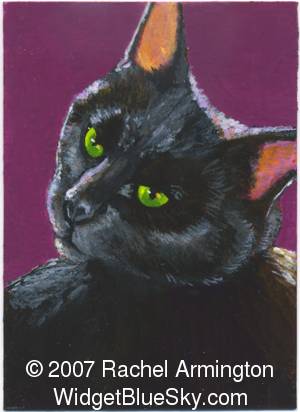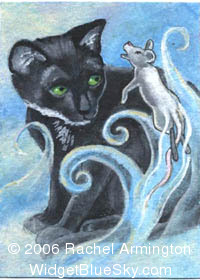Art Cards, Editions & Originals
What is an ACEO

ACEOs are miniature pieces of art that measure 2-1/2" x 3-1/2". If a small piece of art has different measurements than this,
it does not qualify as an ACEO.
The acronym "ACEO" stands for Art Cards, Editions and Originals. They can be original art, print editions or photographs.
The majority of ACEOs are two dimensional, but three dimensional elements may also be incorporated.
Pop-ups, books, collages, and sculpture can all be ACEOs as long as they measure 2-1/2" x 3-1/2"!
ACEO history
ACEOs stemmed off of Artist Trading Cards (ATCs), an idea developed by the artist M.Vänçi Stirnemann.
He based the size of ATCs on sports trading cards. ATCs can only be traded or given away. Their purpose is
to share art and to encourage creative exchange between artists.
Like ATCs, ACEOs may be made with any media, material, or method as long as they measure 2-1/2" x 3-1/2".
ACEOs are made with the intention to sell. The artist Lisa Luree started the ACEO group on eBay in part
to make cards available to collectors.
Support
Your chosen medium will determine the best support for your ACEO. A sturdy support will help your artwork last longer.
If your creation is somewhat flimsy, mount it onto a sturdier base. Whenever
possible, invest in acid free support stock (and glues if you will be mounting your ACEO).
You can purchase die-cut blank cards made out of lovely papers or
140# water color stock. Experiment with as many of these as you can
before you invest in a lot of blank cards.
Some papers may not be the same quality or weight that you usually use. You can always ask a seller
what brand of paper they will be supplying before you buy!
You can cut your own blanks with a cork-backed ruler and a cutting blade. Or invest in a small, quality paper cutter.
Paper cutters with a rotary blade do a nice job. I use the paper I have trimmed from regular paintings to
make my ACEOs. The cards may not have the perfect measurements of a die cut blank, but they have the character of an
original piece of art made by a somewhat measurement-challenged human!
Media
Treat yourself to professional grade materials: they will last you through many, many ACEOs!
There is no limit on what you can use for your ACEOS: oils, pastels,
acrylic, pencils, watercolor, inks, collage, torn paper, crayons, polymer
clay, cloth, photography, and any combination of the following!
Brushes
The quality range for synthetic brushes is the same as for brushes
made with animal hair: Some are well-made and do what they should do, and some are poorly made and can't handle
what you need from them.
For watermedia, choose a brush that has a good point and enough body to hold paint.
If you use crosshatching in your work, look for finer point brushes.
Protecting
and
Displaying ACEOs
coming soon.
Mailing
coming soon.
How To's
coming soon:
- Trading Cards for kids
- Triptych collage Halloween
- Watercolor card
- Colored pencil card
- Mixed media
- Polymer clay
- Handmade book for display
- Envelopes
Suppliers
Dick Blick Art Materials
(with whom we are affiliated) has a great assortment of pre-cut cards of various kinds of supports as well as envelopes, pens and brushes specifically sized for the ACEO and ATC miniature artist. Search for "Trading Cards."
Books
There are many more art books that can teach and inspire than the ones listed here. The books listed here
are more readily available than others. Some of these books are rare and,thus, expensive. Even if your local library
doesn't have a copy, most libraries have exchange programs. Ask your librarian! He or she may have know of other
helpful books as well.
Artist Trading Card Workshop: Create, Collect, Swap by Bernie Berlin

Miniature Painting: A Complete Guide to Techniques, Mediums, and Surface by Joan Cornish Willies
Big Art, Small Canvas
: Paint Easier, Faster & Better by Joyce Washor

The Techniques of Painting Miniatures by Sue Burton This book gives an interesting and concise history of
miniatures (which were named after the red lead pigment minium which was often used in painting). Photographs follow
several miniaturists step-by-step through their paintings. Artist recommendations on brush sizes (ranging from
size 000 to size 4) are given. Many of the miniatures in this book are painted on sheets of Ivorine, a plastic
substitute for ivory. Ivorine appears to be too delicate and temperamental for ACEOs, but the luminous character
of this base shows through in the illustrations.
Information on the Web

coming soon.


